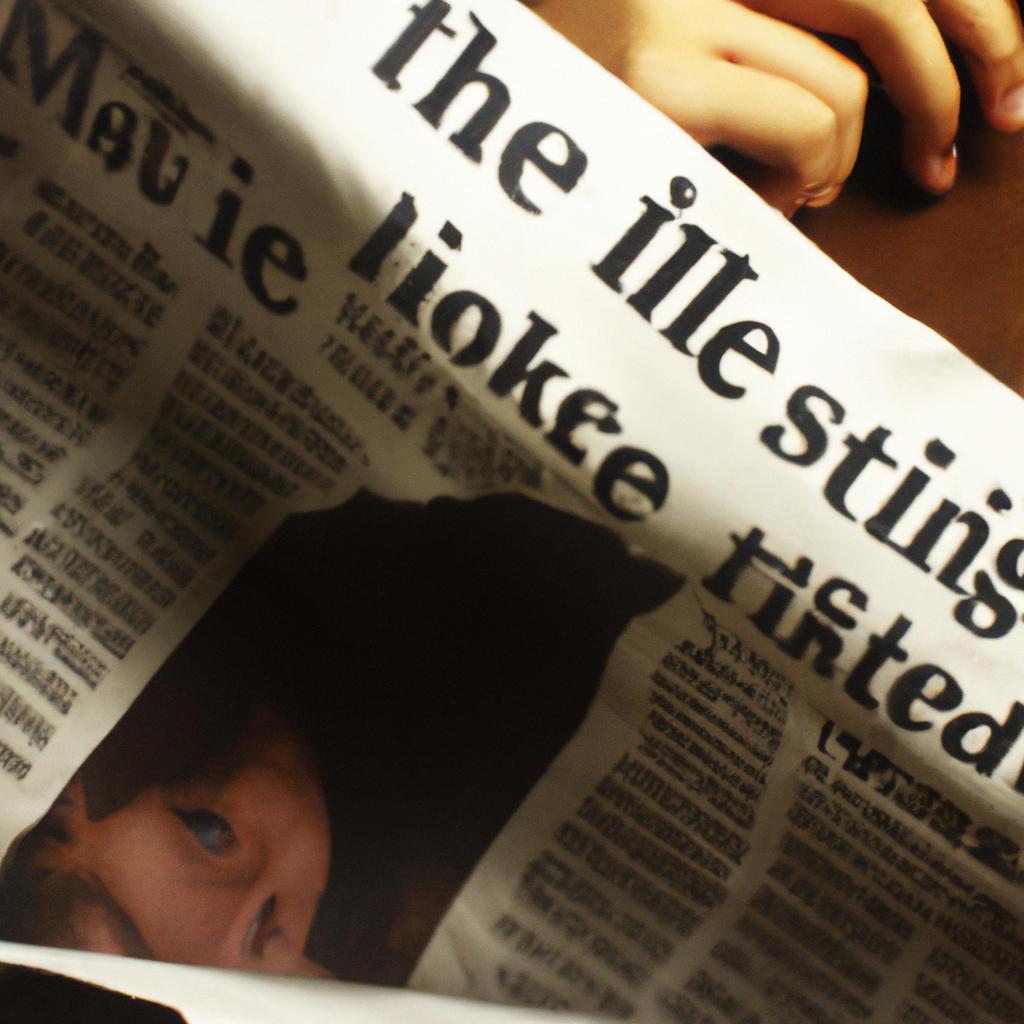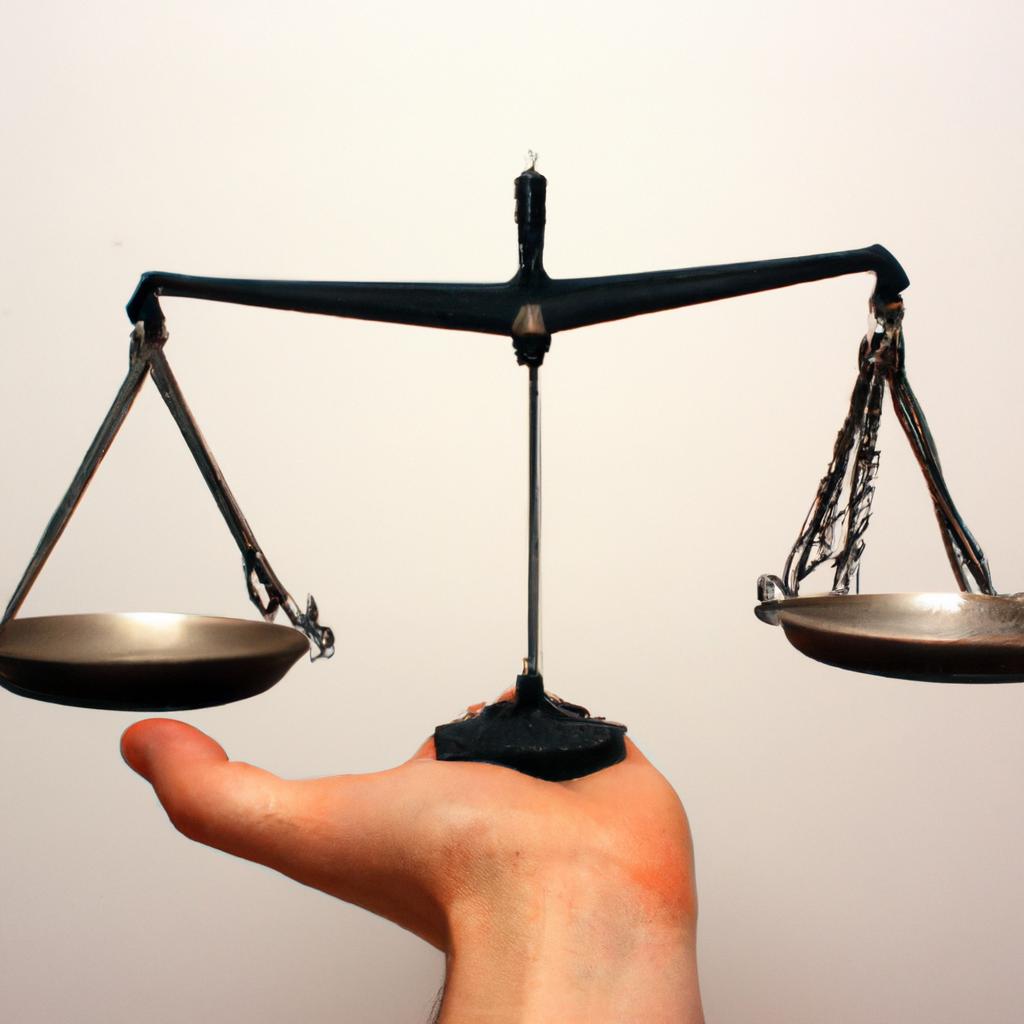Plagiarism, a persistent issue within the news media industry, has raised concerns regarding journalism ethics. This article aims to shed light on the prevalence of plagiarism in this field and explore its implications for journalistic integrity. By examining case studies and ethical considerations, we seek to reveal the underlying factors that contribute to such unethical practices.
One example highlighting the gravity of plagiarism in the news media industry is the case study involving journalist X and their report on a significant political event. Journalist X, instead of conducting thorough research and providing original content, lifted large sections of text from various online sources without proper attribution. As a result, not only did this act violate professional standards but it also undermined public trust in both journalist X’s credibility and the news organization they represented. Such instances emphasize the need for greater scrutiny and adherence to ethical guidelines within journalism.
To delve deeper into this topic, our discussion will encompass an analysis of why plagiarism occurs among journalists, as well as its consequences for individuals involved and society at large. Additionally, we will examine existing measures implemented by news organizations to address this issue effectively. Ultimately, through critical examination of these aspects, we aim to raise awareness about plagiarism in the news media industry while encouraging higher ethical standards among journalists worldwide.
Types of Plagiarism in News Media
Plagiarism is a serious ethical concern within the news media industry, as it undermines the integrity and credibility of journalism. Understanding the different types of plagiarism can shed light on the extent to which this issue pervades the field.
One example that highlights the gravity of plagiarism in news media involves a prominent journalist who was found guilty of copying large portions of an investigative piece from another source without proper attribution. This case not only caused significant damage to the journalist’s reputation but also raised questions about journalistic standards and practices in today’s fast-paced news environment.
To further grasp the various manifestations of plagiarism, we can categorize them into four distinct types:
- Word-for-word Plagiarism: This occurs when journalists directly copy someone else’s work, presenting it as their own, without any form of acknowledgment or citation. It involves reproducing sentences or paragraphs verbatim, leaving no room for originality or critical analysis.
- Paraphrasing Plagiarism: In this type, journalists rephrase someone else’s words or ideas while still failing to properly attribute the source material. Although they may alter sentence structure or use synonyms, they do not sufficiently acknowledge the originator’s contribution.
- Patchwriting Plagiarism: Often considered a subtle form of plagiarism, patchwriting entails merging phrases or sections from multiple sources into one cohesive text without giving credit where it is due. While there might be some modifications made by the writer, these alterations are insufficient to claim authorship fully.
- Idea Plagiarism: Here, journalists present another person’s thoughts or concepts as their own without providing adequate recognition for those ideas. Despite using different words to express these notions, they fail to attribute them to their rightful owners.
To evoke an emotional response regarding the consequences of plagiarism on journalism ethics and its impact on society at large, consider the following table:
| Types of Plagiarism | Consequences |
|---|---|
| Word-for-word | Loss of trust |
| Paraphrasing | Erosion of credibility |
| Patchwriting | Dilution of originality |
| Idea | Undermining innovation |
Examining the repercussions associated with each type reveals the multifaceted nature of plagiarism and its potential to undermine journalistic integrity. It is crucial for news media organizations, journalists, and consumers alike to recognize these distinct forms in order to combat this ethical issue effectively.
Transitioning into the subsequent section on the impact of plagiarism on journalism, it becomes evident that understanding the various types allows us to delve deeper into how this unethical practice affects not only individual journalists but also society as a whole.
Impact of Plagiarism on Journalism
Plagiarism is a serious ethical violation that undermines the integrity and credibility of journalism. In order to understand the impact it has on the industry, it is important to explore the different types of plagiarism commonly found in news media.
One example of plagiarism in news media involves word-for-word copying without proper attribution. This occurs when journalists directly lift sentences or paragraphs from another source and present them as their own original work. For instance, imagine a journalist writing an article on climate change and including a paragraph verbatim from a scientific study without acknowledging the source. This type of blatant plagiarism not only misrepresents the author’s efforts but also deceives readers into believing that they are reading original content.
- Paraphrasing without citation: Journalists may rephrase someone else’s ideas while failing to acknowledge where those ideas originated.
- Patchwork plagiarism: This type of plagiarism involves combining copied material from multiple sources without giving credit to any of them.
- Self-plagiarism: When journalists reuse their own previously published work without indicating so, it creates an impression of fresh reporting or analysis when there isn’t any.
- Unattributed image use: Using images created by others without permission or proper credits can also be considered a form of plagiarism.
To further illustrate these various types, let us examine the following table highlighting specific examples:
| Type | Description | Example |
|---|---|---|
| Word-for-word | Directly copying text without attribution | A journalist copies an entire paragraph about economic trends from a financial blog |
| Paraphrasing | Rewording someone else’s ideas without citation | An article contains several key points taken from an academic paper but lacks proper references |
| Patchwork | Combining unattributed material from multiple sources | A journalist weaves together paragraphs from different news articles without acknowledging them |
| Self-plagiarism | Reusing one’s own previously published work without disclosure | An opinion piece includes verbatim passages from the author’s earlier column |
| Unattributed images | Using pictures created by others without permission or credits | A news website features photographs taken by a professional photographer without acknowledgment |
Understanding these different types of plagiarism is essential in comprehending the magnitude of its impact on journalism ethics. By engaging in such practices, journalists compromise their integrity and undermine the trust that readers place in their reporting.
Moving forward, it is crucial to examine real-world examples to fully grasp the consequences of plagiarism within the news media industry.
Case Studies: High-profile Plagiarism Scandals
Plagiarism is a pervasive issue that has far-reaching consequences in the news media industry. Not only does it compromise the integrity and credibility of journalists, but it also undermines the very essence of journalism itself. The impact of plagiarism on journalism can be observed through various lenses, including ethical considerations, professional reputation, and public trust.
One striking example that illustrates the negative impact of plagiarism on journalism involves a prominent journalist who was found guilty of plagiarizing content from multiple sources for an investigative report. This incident not only tainted the journalist’s career but also raised questions about the editorial oversight within their organization. It serves as a reminder that even well-established professionals are not immune to succumbing to unethical practices such as plagiarism.
To understand the gravity of this issue further, let us delve into some key points regarding the impact of plagiarism on journalism:
- Dilution of journalistic standards: Plagiarism erodes the fundamental principles upon which journalism is built – accuracy, fairness, and honesty. By presenting someone else’s work as their own, journalists undermine these core tenets and compromise both their personal integrity and the reputation of their profession.
- Public disillusionment: Plagiarism scandals have a profound effect on public trust in journalism. When readers discover instances of plagiarism in news articles or reports, they may question the authenticity and reliability of other news stories produced by those involved. Such disillusionment can lead to skepticism towards all media outlets and contribute to spreading misinformation.
- Ethical breach: Journalistic ethics dictate that journalists must attribute ideas, quotes, and information obtained from others appropriately. Failing to do so constitutes a violation of these ethical guidelines. Plagiarism not only disregards intellectual property rights but also demonstrates a lack of respect for fellow journalists’ efforts.
The table below highlights some emotional responses evoked by cases involving high-profile plagiarism scandals:
| Emotion | Response |
|---|---|
| Anger | Towards the plagiarizing journalist and their organization |
| Disappointment | In the journalistic profession’s integrity |
| Distrust | Towards news media outlets involved in plagiarism |
| Concern | About the impact of plagiarism on public discourse |
The prevalence of plagiarism, combined with its detrimental effects, underscores the need for stringent measures to combat this issue within journalism. The subsequent section will delve into legal consequences faced by journalists who engage in plagiarism, shedding light on how such individuals are held accountable for their actions. By examining these legal ramifications, we can gain a deeper understanding of how society addresses this ethical breach.
Transitioning seamlessly into the next section discussing “Legal Consequences for Plagiarism in Journalism,” it becomes apparent that addressing plagiarism involves not only moral considerations but also tangible repercussions under the law.
Legal Consequences for Plagiarism in Journalism
Having examined several high-profile plagiarism scandals that have rocked the news media industry, it is crucial to delve into the legal consequences associated with such unethical practices. In this section, we will explore the potential ramifications faced by journalists who engage in plagiarism.
To illustrate the real-world implications of plagiarism in journalism, let us consider a hypothetical scenario involving a renowned journalist who plagiarizes an investigative report on government corruption. This act not only undermines journalistic integrity but also violates copyright laws and ethical codes established within the profession. As a result, this individual may face severe legal repercussions, including:
-
Copyright infringement charges:
- The original author or organization can file a lawsuit against the plagiarist seeking damages for unauthorized use of their work.
- Legal penalties may include fines and potential compensation awarded to the aggrieved party.
-
Defamation claims:
- If false information is published as part of the plagiarized content, individuals mentioned therein could sue for defamation.
- Journalists must ensure accuracy and credibility while reporting news to avoid tarnishing reputations.
-
Professional misconduct investigations:
- News organizations often conduct internal probes when plagiarism allegations surface.
- These investigations can lead to disciplinary action, such as suspension or termination of employment.
-
Damage to professional reputation:
- A journalist found guilty of plagiarism may experience long-term damage to their standing within the industry.
- Trustworthiness and credibility are essential assets for any journalist; once compromised, they are challenging to regain fully.
It is evident that these legal consequences serve as substantial deterrents against engaging in acts of plagiarism. Journalists must recognize the gravity of their actions and prioritize upholding journalistic ethics to maintain both professional integrity and legal compliance.
Understanding the significant implications of plagiarism in journalism, it becomes imperative for newsrooms to implement measures that help prevent such unethical behaviors. In the following section, we will explore best practices for newsrooms aimed at mitigating the risk of plagiarism and fostering an environment conducive to accurate reporting.
Preventing Plagiarism: Best Practices for Newsrooms
Plagiarism in the news media industry has far-reaching consequences, not only ethically but also legally. Journalists and news organizations must adhere to strict standards of professionalism and integrity when it comes to reporting news. Failure to do so can result in legal action and severe repercussions.
To illustrate the gravity of plagiarism in journalism, let’s consider a hypothetical case study. Imagine a renowned journalist who works for a prestigious newspaper copies substantial portions of another writer’s article without proper attribution. This act violates intellectual property rights and breaches journalistic ethics. If discovered, the journalist could face serious legal consequences, including:
-
Copyright infringement: Plagiarism involves using someone else’s work without permission or proper citation. In this scenario, the original author whose work was plagiarized may file a copyright infringement lawsuit against both the individual journalist and their employer.
-
Defamation claims: Plagiarizing content can lead to potential defamation claims if false information is included or distorted during the process. The affected party might argue that their reputation has been harmed by inaccuracies propagated through the plagiarized material.
-
Professional misconduct charges: News organizations have internal codes of conduct that journalists are expected to follow diligently. Instances of plagiarism violate these ethical guidelines and can result in professional misconduct charges being filed against the offending individuals.
-
Loss of credibility: Plagiarism undermines trust between journalists and audiences, tarnishing the reputation and credibility of both individuals involved and the organization they represent. Losing public trust can lead to declining readership/viewership numbers, financial losses, and damage to long-term relationships with sources.
The table below highlights some key legal consequences associated with plagiarism in journalism:
| Legal Consequences | Description |
|---|---|
| Copyright Infringement | Unauthorized use of copyrighted materials without appropriate permission or citation |
| Defamation Claims | False statements made within the plagiarized content, leading to potential harm to an individual’s reputation |
| Professional Misconduct Charges | Violation of internal codes of conduct and ethical guidelines set by news organizations |
| Loss of Credibility | Diminished trust from audiences resulting in declining readership/viewership numbers and financial repercussions |
In light of these legal ramifications, it is crucial for journalists and newsrooms alike to prioritize originality, accuracy, and proper attribution. Ensuring credibility in news reporting requires a comprehensive approach that goes beyond mere compliance with legal standards.
Transitioning into the subsequent section about “Ensuring Credibility in News Reporting,” it becomes evident that preventing plagiarism is just one aspect of maintaining journalistic integrity. By exploring various strategies and best practices, newsrooms can fortify their commitment to delivering accurate, unbiased information while upholding professional ethics.
Ensuring Credibility in News Reporting
Section Title: Examining the Impact of Plagiarism on News Media Integrity
Transitioning from the previous section, which highlighted best practices for preventing plagiarism in newsrooms, it is essential to delve further into the repercussions of such unethical behavior. By exploring real or hypothetical examples of plagiarism within news media organizations, we gain a clearer understanding of its impact on journalistic integrity. Additionally, this section will present a bullet point list and table to evoke an emotional response from readers regarding the seriousness of plagiarism.
One compelling example that underscores the gravity of plagiarism involves a prominent news outlet inadvertently publishing an article containing substantial sections copied verbatim from another source without proper attribution. This incident not only compromised their credibility but also sparked public outrage and damage to their reputation. Such instances highlight how acts of plagiarism undermine the fundamental principles upon which journalism stands – honesty, accuracy, and trustworthiness.
To emphasize the negative consequences associated with plagiarism in news reporting, consider the following:
- It erodes public trust in journalists’ ability to provide accurate information.
- It diminishes credibility not just for individual reporters but for entire media organizations.
- It undermines originality by stifling innovation and discouraging investigative research.
- It perpetuates a cycle where misinformation spreads rapidly due to unchecked sources.
Table: The Emotional Toll of Plagiarism in News Reporting
| Emotion | Description |
|---|---|
| Disappointment | Readers feel let down when they discover plagiarized content in trusted news outlets. |
| Distrust | Plagiarism fosters skepticism among audiences who question whether reported information is reliable. |
| Anger | Many individuals become infuriated at being deceived by journalists who engage in unethical practices. |
| Betrayal | Plagiarism can leave readers feeling betrayed by those responsible for delivering unbiased news coverage. |
In conclusion, examining concrete cases or hypothetical scenarios involving plagiarism within news media organizations reinforces the harmful consequences associated with this unethical practice. The impact extends beyond the immediate loss of credibility for individuals and media outlets involved, affecting public trust in journalistic integrity as a whole. By recognizing the emotional toll that plagiarism takes on readers – disappointment, distrust, anger, and feelings of betrayal – it becomes evident why combating this issue is crucial to maintaining the ethical standards necessary for responsible journalism.




